#Statecraft
Text
First, learn to be governed; then govern.
ἄρχε πρῶτον μαθὼν ἄρχεσθαι.
--Solon, apud Diogenes Laertius 1.60
#quote#quotes#classics#tagamemnon#Solon#Solon of Athens#philosophy#ancient philosophy#statecraft#Diogenes Laertius#Greek#Greek language#Greek translation#Ancient Greek#Ancient Greek language#Ancient Greek translation
36 notes
·
View notes
Text
Why Arnor Failed as a State

So in lord of the rings, Aragorn, the titular returning king of the Third book/film, is the last descendant of Elendil, the first High King of Arnor and Gondor.
The entire plot is about how the royal family finaly, after all these years comes home to Gondor in the south from the cold, hard north, where the other realm of the Dunedain failed.
That said we are never really given a particularily detailed breakdown of why Arnor ultimately failed beyond the obvious military one(It was defeated by the rising power of Angmar before that too crashed and burned), the geographics one(the population never really managed to reach the level it could have, and that was before the plague), and the political one(the realm split into 3 lesser realms that squabbled).
On paper these seems easy enough reasons for why the northern realm crashed and burned, but once you actually start digging into it, it becomes pretty obvious that unlike Gondor, Arnor had some very serious fundamental problems that it never really managed to fix, which brought it down in the end.
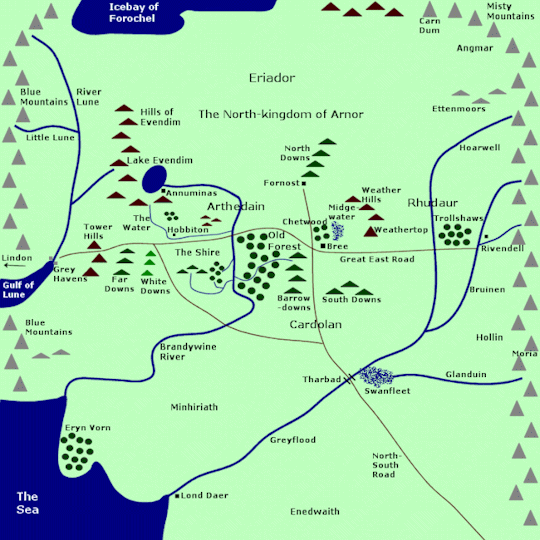
1. It mishandled it's amazing geopgraphy
Looking at Arnor from above, it seems to have ALL the advantages. It has mazsive, open fertile plains, 2 great rivers, mild climate except for the far borth, clear, easy to defend natural boundaries, with the only open pathway into the realm being the hard to pass through corridor feom forodwaith.
Politically apeaking it was also set for success as the realm had managed to unify all the local peoples within it's borders underneath its banner, which they were content with for a very long time.
So with all of this in mind, where did Arnor go wrong?
It failed to harness it's rivers, that's how.
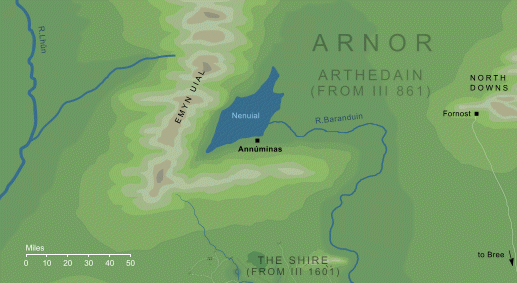
When choosing the place for capital for the new realm, one would expect it to be on one of the rivers, either at the mouth, or at an important spot.
The Dunedain chose to build the capital Annuminas at the great lake from whoch the Baranfuin/brandywine river originates from.
This isnt a... A terrible choice for a capital.
It allows the royal family to dominate the trade flowing up and down the river by controlling the spot where you can build ships, and have a massive riverrine fleet stationed in case of conflict.
So whats the problem?
The Dunedain never dredged either of their rivers, thats the problem.
Rather than wideding the bottom, to allow bigger, more usefull ships to pass up and down the river for transport of food, trade goods, and troops, Arnor instead did the exact opposite, and not only let natural fords stand, but built bridges that would prevent any trading river network from flourishing.
As far as i can tell, Arnor didnt have any particular noteworthy ocean navy, but even if Arnor was never going to invest into one such, the fact that they never did the work to make their rivers into a fountain of wealth, trade was one of the major reasons for their big decline.
But if they didn't invest into making their rivers more navigable, at the very least they would invest in horse power, in order for their people to travel quickly across the plain, allowing a caravan based trade netowork to do what rivers did not, right?
Well, no, and that leads me into my next point.
2. They Failed to turn into a cavalry based military, economic force, or political one
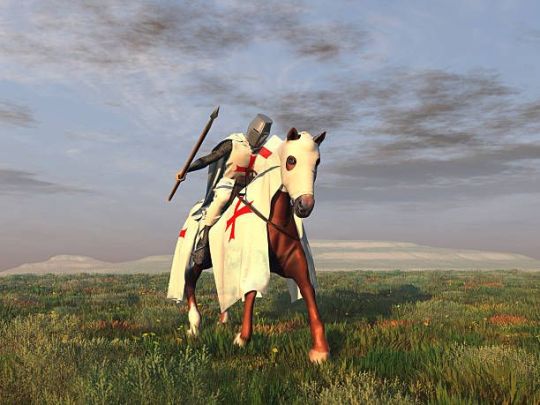
When the last king of Gondor(then prince) before Aragorns coming near a millennia later, came to destroy Angmar with a truly stunningly large relief force at the end of Angmar's power, he noted to his surprise just how perfect Arnor's plains would be for his cavalry in the task ahead of him.
And he was right. While it was the overhwelming numbers that won the day, it was the cavalry that was the main star, and allowed the army of the west to sweep over Angmar and end it forever with such ease.
With this in mind, it brings the question of why didnt the Arnorian Dunedain switch over to a completely horse based army, or at the very least make knights the shocktroops of the military the way Gondor did?
The reason seems simple enough.
Gondor was forced to fight endless wars against all of its neighbors and had to constantly adapt and change and improved, while Arnor was at peace for the better part of a millenium before it broke.
When the successor state of Arthedain had to adopt to new warfare, it always found itself outnumbered, and from the accounts of it's wars with Angmar, what they ended up doing was simply rely on powerful fortifications to fight defensive wara, and it's alliance networks to rally addiational troops.
Not strategies withouth merrit, but it's clear that Arthedain never managed to become a particularily great military powerhouse... But it could have if it had changed over to cavalry as the main feature of the army.
Instead they relied on what the numenoreans of old did. Arrow, sword and shield.
They no doubt had mounted troops of some sort, but it was clearly not their speciality just looking at how their successors, the rangers of the north prefer fighting.
But the fact is, Arnor should have had Cavalry centered armies from the very start, leaving behind the old Numenorean way of fighting the moment they realised all their future fighting would be on open plains.
However, this lack of focus on horses had another side effect. One that along with their squandering their rivers would contribute to another problem.
3. A lack of integration of the kingdom's ethnicities.
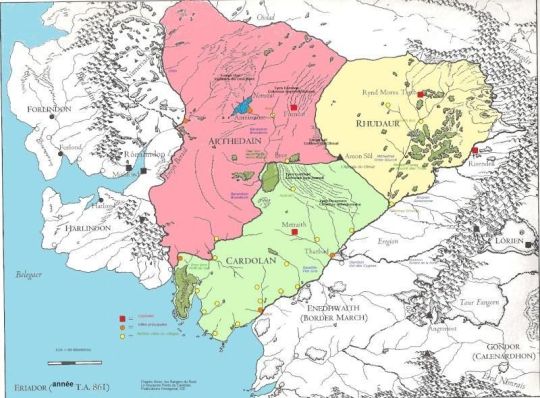
When Arnor broke off into 3 different realms, while the impetous was 3 sons fighting for control, when you look at the bigger picture, its clear that what actually happened here is that the 3 realms broke off very neatly along the kingdoms 3 main ethnicities, who each backed their own prefered candidate.
Arthedain, the biggest and strongest, centered around the heartland was populated by mostly ethnic dunedain, along with breemen as a smaller ethnicity.
Cardolan was ruled by a dunedain elite, but the ethnicity that dominated was the natice, pre numenorean population who were centered around the barrow tombs they would later be buried in(and would be corrupted by the witch king).
And finally Rhudar was also ruled by a dunedain elite, but the real power behind their revolt against the capital was the natice hillmen, who, being dissatiafied with Dunedain rule, and fueled by ambition decided to ally with Angmar in a bid for supremacy(only to later be exterminated by angmar once they no longer served their purpose).
What we see here is a very clear breakdown of the kingdoms, caused by a failed integration policy.
Clearly Annumias and later Fornost failed to bring these minorities into the fold successfully the way Gondor did eith its minorities, who became proud gondorians.
And we can in large part blame this on the capitals inability to project a sense of unity across the land. Which would have been easy to do if they had successfully tamed and harnessed their rivers, making all 3 corners part of a connected riverrine network, or had used horse based travel and trade as a matter of course to ensure everyone was connected into one economic and political policy.
Its very telling that the only people the Dunedain successfully integrated into their realm were the two minorities who lived right by the capital of Fornost(The hobbits and Breemen). Because these were the people who lived close enough that you could actually get there by foot at a reasonable time.
So with all of this in mind, there is a question to be raised. Why did Arnor squander all of it's natural advantages so badly?
Well i've gone over the military one. A stupily long amount of peace made the realm unprepared for innovation that allowed Gondor to become a powerhouse.
But no the real reason why the Arnorians would have seen no need to make changes to bolster trade, in and outside the kingdom, is due to a factor i have not gone over yet.
4. Trade mistakes.
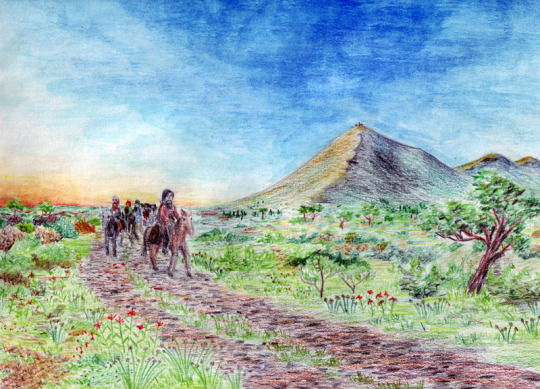
Arnor and Arthedain both sit on an ancienct road used by the dwarves, both from across the misty mountains in the direction of rivendel, but also from gondor, and far more importantly for this dissection, during both Arnor and Arthedain's lifetimes, this road systwm would have been used by Khazad-Dum, Moria, at it's height.
All 3 directions heading to the Dwarves mines in the blue mountains and the great harbors of the Elven realm of Lindon.
It would in short, be one of the most lucrative trade routes of the age.
But, and this is critical, it was not a network Arnor actually had to do some work to take a advantage of.
They did not need to make caravans, or build trade fleets, ocean or riverrine. Hell, they didn't even need dedicated traders of their own.
They were middle men, who by virtue of sitting right on this route got to toll and harness the wealth this route generated withouth hacing to do any real work.
And that, ultimately was the problem. They didnt need to innovate. They didnt need to adapt and improve and put their land to full use, because all the wealth they could possibly use was there withouth work.
And that sucks, because clearly Arnor had A LOT of products they could have sold abroad. We can tell that just by looking at it's most prosperous successor state(the shire) and looking at what sort of technology they inherited from their original overlords.
The hobbits of the shire has paper mills, clockmakers, dye industry, matches, bound books, door knobs, integrated locks and latches, and on and on. Compare it to rohan, and they are centuries ahead in tech by our standards.
It's often easy to forget(give tolkien was clear that hobbits just did not move past a certain point in techonology) that by the standards of the day, the Hobbits are very technologically advanced compared to most... And ALL of that is things they inherited from their overlords.
Wheter Arthedain and by extension Arnor invented all of these technologies themselves(as there are a number of things clearly not found in gondor it cant all have been inherited from numenor), or they adapted it through Trade with Khazad Dum or Lindon, improved upon such foreign concepts, or kore likely a mixture of all of these, it's clear that Arnor had the capacity to make these, and by extension the fact they are still around after the kingdom fell, in the form of the hobbits being self sufficcient(otger than presumably the raw metal materials they trade for with the dwarves) means this was not some exceptional level of tech for the kingdom.
It was the kingdom's standard, and if they had been interested in actually exporting these things abroad, Arnor would probably have been more wealthy than Gondor by a far margin.
But they didnt. Because they didnt see any need to innovate their trade capacity in such a manner. Which in turn led to them not harnessing their lands capacity for cheap, easy transportations, which in turn led to them not integrating their people the way gondor(who's people are all connected through the sea and Anduin, and what comes with them), which led to them being far more divided than they should have been.
And while their long period of peace allowed them to overtake Gondor in so many things, when it came to military advancements, they were not only voefully behind, but when it came time to innovate, they lacked both the resources, and the spark to truly overhaul their military and tactics, instead relying on the same old classics until it brought the kingdom crashing down.
#arnor#gondor#numenorians#technology#meta#trade#military#lord of the rings#tolkien's legendarium#statecraft#statebuilding
3 notes
·
View notes
Text
"Leviathan Unveiled: Navigating the Depths of Hobbesian Political Philosophy"
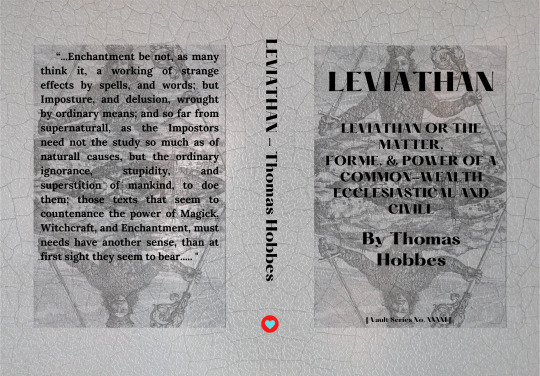
Thomas Hobbes' "Leviathan" stands as a seminal work in political philosophy, providing a profound exploration of the social contract and the nature of government. Published in 1651, during a tumultuous period in English history, Hobbes crafted a philosophical masterpiece that sought to address the chaos and disorder prevalent in society.
The central theme of "Leviathan" revolves around Hobbes' depiction of the hypothetical state of nature, a condition he famously describes as a "war of every man against every man." Hobbes contends that without a structured authority, human life would be characterized by constant conflict and anarchy. To escape this state of nature, individuals enter into a social contract, surrendering some liberties to a sovereign authority in exchange for protection and order.
The metaphorical "Leviathan" represents this sovereign power, a colossal entity with the authority to maintain peace and prevent chaos. Hobbes argues for the absolute power of the Leviathan, suggesting that a powerful centralized government is necessary to ensure the stability of society. This perspective, while controversial, laid the groundwork for later political philosophies and discussions on the role of government.
Hobbes' work also delves into the relationship between church and state. He advocates for a unified authority to avoid conflicts arising from religious differences. In his view, the sovereign power should control both the ecclesiastical and civil spheres to maintain social cohesion.
One of the strengths of "Leviathan" is Hobbes' systematic approach to political theory. He applies a scientific methodology, drawing parallels between the natural world and political structures. This analytical framework was innovative for its time, influencing subsequent philosophers and political thinkers.
However, "Leviathan" has sparked significant debate and criticism. Hobbes' advocacy for absolute monarchy and his rather bleak view of human nature have been challenged by later philosophers who championed individual liberties and more optimistic perspectives on human behavior.
In conclusion, Thomas Hobbes' "Leviathan" remains a cornerstone of political philosophy, offering a foundational exploration of the social contract, sovereign authority, and the structure of government. While controversial and subject to critique, its impact on the development of political thought cannot be overstated, making it an essential read for those interested in understanding the roots of modern political theory.
Thomas Hobbes' "Leviathan" is available in Amazon in paperback 19.99$ and hardcover 25.99$ editions.
Number of pages: 484
Language: English
Rating: 8/10
Link of the book!
Review By: King's Cat
#Thomas Hobbes#Political philosophy#Commonwealth#Leviathan#Ecclesiastical#Civil#State power#Social contract#Political theory#Sovereignty#Absolutism#Political authority#Human nature#Political science#Government#Power dynamics#Social order#Political structure#Statecraft#Absolute authority#Commonwealth theory#Civil society#Political obligation#Commonwealth formation#Political theology#Civic governance#Social contract theory#Authority and obedience#Leviathan symbolism#Hobbesian philosophy
3 notes
·
View notes
Text

I might have forgotten to update y'all for a bit there, sorry! Anyways, as you can see from the map above, World War Genovia has started. The official name of the operation is the FGC (F Genovia Convention). Basically, Genovia screwed everyone over and then didn't own up to their mistakes. Instead, they doubled down and played the victim when they were confronted about it. They never paid us back for the Globe of Frost. They also promised to share their resources from Sapphire Island with the rest of the world as a consequence from them breaking the Global Peace Award. They never did that. They also claim that nobody asked for it. The UN's response to that was basically "It was your responsibility to share the resources, not ours to request them". Anyways, the UN voted to either expel or condem Genovia (I don't know which). This cost them 5 PC. A big part of what caused this sudden anti-Genovia sentiment was 1. The idea that this is most likely the last turn of the simulation. 2. Genovia spent all of their resources on structures for building up their own Quality of Life score while they still owed tons of resources to the rest of the world. 3. Everyone was tired of the self-victimization that was going on in Genovia. All that being said, do I feel bad about what's going on? Yes, I do. I really don't want anyone to suffer from this whole thing. Does Genovia deserve the wrath of the entire world? Debatable. Truth be told, our country really doesn't have anything to gain from this venture. I think we mostly joined the coalition because of group think, well, that and resentment. It'll be interesting to see if the simulation ends after this turn like we all suspect it will or if our professor continues it on for another turn or two to see how this all plays out. At the moment, 2/3rds of Genovia and four other people from other countries are online, so needless to say, this is a big day in Statecraft history (for our world at least). I'll try to make sure to update you with more information! This has been really fun blogging about! :D
#statecraft#simulation#simulations#political science#statecraft international relations#collective action issues#intro to ir#statecraft ir#international affairs#international relations#spia#war#genovia#neptunia#international conflict#the girls are fighting#presidential alert: the girls are fighting
8 notes
·
View notes
Text
Shuri the Protector
What kind of Black Panther will Shuri be? This is the one of the many exciting questions that have been rattling around in my head during the many times that I've seen Wakanda Forever. That question then opens up other questions like 'What is the role of the Black Panther in a world where Wakanda is a known, but isolated world power?' 'What does an alliance with Talokan entail?' 'How do Shuri's perspectives and skills change the role?' 'What does it mean for the Black Panther to be disconnected from the role of ruler? (I know, I'm thinking way too much about this!)
Clearly, I'm really excited about Shuri's tenure as Black Panther, especially at a time in the MCU's world that is quickly changing in all facets. She shares her older brother's empathy for others, but where he tended towards the idealistic, Shuri is a practical, pragmatist who couples that with a high degree of empathy for others (well, when she's not traumatized and looking for revenge that is). I think this will translate on how she will protect Wakanda and help others. So where T'Challa opened Wakanda to the world by revealing Wakanda's advances to the UN and immediately opening up outreach center in places of personal import (i.e. Oakland being the first due to it's connection with his cousin), Shuri may have opened up Wakanda more gradually, or to more of a strategic benefit to those who need it the most. Neither of these is wrong per se, they just speak to the differences between the siblings. T'Challa's actions as Black Panther tended towards the morally symbolic, I would expect Shuri's to be more practically focused on concrete help for others or protection.
This is helpful because Wakanda finds itself in the midst of two competing pressures internationally that demand pragmatism among those in leadership. At the end of WF, Wakanda finds itself isolated and specifically targeted by Western powers both militarily and politically in order to access its vibrainum. On the other side, Wakanda finds itself in a hastily created alliance with the militarily superior Talokan, an alliance predicated on protecting the secrecy of said military power and whose leader is anticipating an international incident that will hopefully force Wakanda to call it into a worldwide war.
A Black Panther cannot protect Wakanda from the negative aspects of these circumstances with a physical fight. Rather, navigating these dangerous circumstances requires nuance, practicality, and improvisation. Both Talokan and Western powers want to goad Wakanda into a fight and Shuri most likely knows that won't be a good outcome for anyone.
These factors seem to define the role of the Black Panther as an international representative--something between a symbolic figurehead/foreign minister/head of intelligence role on top of her head of science role (which I imagine she'd have to do some delegating for). The immediate goal is to proactively handle the relationship with world powers through a multitude of means. One of Shuri's strengths is the full breadth of her skills and her readiness to use them interchangeably. In Wakanda Forever, Shuri went from designing equipment in the lab to infiltrating a dorm room, escaping Boston cops, invoking state parley with Namor, exhibiting historical knowledge and statecraft skills not mentioning her knowledge of phonology and desire to help even those who had captured her. I could easily see her using all of those along with the physical powers of the Black Panther and her technological advancements in very effective ways. I would also imagine that she would be buttressed by a team including the Midnight Angles, Nakia, and maybe Ross(?) as kind of a foreign affairs branch depending on how it goes. That could be interesting.
If writers in the MCU are willing to do the work to depict the women of Wakanda in nuanced, complex, and serious ways while doing this work the mold of Coogler and Cole, I think it could lead to some interesting stories.
#wakanda forver spoilers#wakanda forever#shuri#Talokan#vibranium#black panther#spoilers#namor#statecraft#mantle
3 notes
·
View notes
Text



Thread
#Twitter#Wagatwe wanjuki#Leftists#States#Fascist#Statecraft#Boost#Domestic violence awareness month#Chickened#Cumulative#Foucault#Casual sex#Sexuality#Discourses#Conservative#Defines#Norms#Thread
2 notes
·
View notes
Text
One thing about 17th century France that shocks me as a gerontocracy denizen is just how young Cardinal Richelieu was--first minister before is 39th birthday, dead at 57.
2 notes
·
View notes
Text
Dangerous Narratives: Warfare, Strategy, Statecraft
by Ed. Ajit Maan (Author), Howard Clark (Author), Brian Steed (Author), Thomas Drohan (Author), Paul Cobaugh (Author), Aleksandra Nesic (Author), Christopher Holshek (Author), Frank Straub (Author), David Ronfeldt (Author), John Arquilla (Author)
We specialize in Narrative Warfare – from undermining weaponized narratives launched by adversaries, to designing comprehensive strategies to achieve…

View On WordPress
#Ajit Maan#author#dangerous narratives#military#narrative#narrative strategy#narrative warfare#scholar#statecraft#strategy#think tank#War#warfare
0 notes
Text
One of the most widely read texts of the High Middle Ages. The Secretum Secretorum:
659J. Aristotle (pseudo) Tr Johannes Lorchner. Rāzī, Muḥammad ibn Zakarīyā Abū Bakr al-; (864?-925?).
Das aller edlest und bewertest Regiment der gesundtheyt, Auch von allen verßorgen Künsten un[d] Königklichen Regimenten Aristotelis. Das er dem Großmechtigen König Alexandro zůgeschrieben hatt. Auß Arabischer Sprach durch Meister Philipsen, dem Bischoff Vonn Valentia, der Stadt Jerapolis, In…
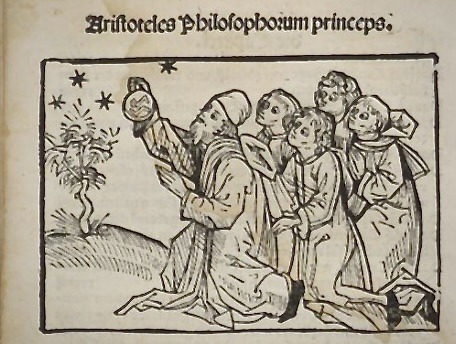
View On WordPress
0 notes
Text
Creative Writer
Navigating the Cyclical Paradigms of Governance: An In-depth Analysis
The intricate dance between decentralization and centralization forms the cornerstone of human societal evolution, embodying a pattern that is both timeless and inevitable. This dynamic, a pendulum perpetually swinging across the spectrum of governance, is underpinned by the unchanging facets of human nature…

View On WordPress
#Autonomy#Biopsychosocial Framework#Centralization#Collective Action#Decentralization#Governance#Historical Dynamics#Machiavellian Philosophy#Power Dynamics#Societal Evolution#Statecraft#Strategic Adaptation
0 notes
Text
youtube
Secretary of State Antony J. Blinken participates in a conversation at the 92nd Winter Meeting of the U.S. Conference of Mayors in Washington, D.C.
#youtube#SecretaryofState#AntonyJBlinken#USConferenceofMayors#ModernDiplomacy#Diplomacy#USStateDepartment#Government#Politics#InternationalRelations#GlobalAffairs#USForeignPolicy#MayorsConference#USCities#Leadership#PublicService#ForeignRelations#DiplomaticTies#Municipalities#Statecraft#ForeignAffairs
0 notes
Text
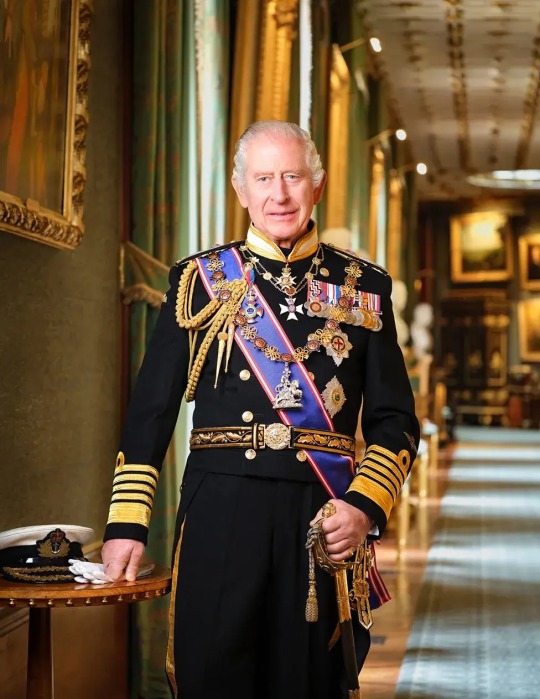
King Charles III
The portrait of the King that will hang in public buildings such as courts and government offices has been unveiled.
Taken in Windsor Castle, it is a very traditional formal portrait of the King in an Admiral of the Fleet uniform, with medals and honours on display.
#KingCharlesIII#Monarchy#RoyalFamily#FutureMonarch#Royalty#Crown#Throne#RoyalLegacy#RegalLife#KingdomLegacy#Dynasty#RoyalDecree#FutureKing#MonarchialRule#PalaceLife#CeremonialDuties#RoyalHeir#Statecraft#SovereignPower#NobleBloodline#today on tumblr
0 notes
Text
"Leviathan Unveiled: Navigating the Depths of Hobbesian Political Philosophy"

Thomas Hobbes' "Leviathan" stands as a seminal work in political philosophy, providing a profound exploration of the social contract and the nature of government. Published in 1651, during a tumultuous period in English history, Hobbes crafted a philosophical masterpiece that sought to address the chaos and disorder prevalent in society.
The central theme of "Leviathan" revolves around Hobbes' depiction of the hypothetical state of nature, a condition he famously describes as a "war of every man against every man." Hobbes contends that without a structured authority, human life would be characterized by constant conflict and anarchy. To escape this state of nature, individuals enter into a social contract, surrendering some liberties to a sovereign authority in exchange for protection and order.
The metaphorical "Leviathan" represents this sovereign power, a colossal entity with the authority to maintain peace and prevent chaos. Hobbes argues for the absolute power of the Leviathan, suggesting that a powerful centralized government is necessary to ensure the stability of society. This perspective, while controversial, laid the groundwork for later political philosophies and discussions on the role of government.
Hobbes' work also delves into the relationship between church and state. He advocates for a unified authority to avoid conflicts arising from religious differences. In his view, the sovereign power should control both the ecclesiastical and civil spheres to maintain social cohesion.
One of the strengths of "Leviathan" is Hobbes' systematic approach to political theory. He applies a scientific methodology, drawing parallels between the natural world and political structures. This analytical framework was innovative for its time, influencing subsequent philosophers and political thinkers.
However, "Leviathan" has sparked significant debate and criticism. Hobbes' advocacy for absolute monarchy and his rather bleak view of human nature have been challenged by later philosophers who championed individual liberties and more optimistic perspectives on human behavior.
In conclusion, Thomas Hobbes' "Leviathan" remains a cornerstone of political philosophy, offering a foundational exploration of the social contract, sovereign authority, and the structure of government. While controversial and subject to critique, its impact on the development of political thought cannot be overstated, making it an essential read for those interested in understanding the roots of modern political theory.
Thomas Hobbes' "Leviathan" is available in Amazon in paperback 19.99$ and hardcover 25.99$ editions.
Number of pages: 484
Language: English
Rating: 8/10
Link of the book!
Review By: King's Cat
#Thomas Hobbes#Political philosophy#Commonwealth#Leviathan#Ecclesiastical#Civil#State power#Social contract#Political theory#Sovereignty#Absolutism#Political authority#Human nature#Political science#Government#Power dynamics#Social order#Political structure#Statecraft#Absolute authority#Commonwealth theory#Civil society#Political obligation#Commonwealth formation#Political theology#Civic governance#Social contract theory#Authority and obedience#Leviathan symbolism#Hobbesian philosophy
0 notes
Text
Mo Ottomans, Morean War
An AI-penned script about the Seventh Ottoman-Venetian War. The wealth of information and firsthand accounts of the war could make for a compelling story of statecraft in the early 18th century and a surprisingly erudite assessment of the great powers of Europe prior to a series of revolutions at the end of the century. Instead, the AI writes a fantastical tale resulting in a laughably mediocre film relying on Orientalist tropes about the Ottoman empire. Also, as there are no actors available to appear on screen, the entire film is cobbled together from Italian educational film strips, overdubbed with English. It is cartoonish and jingoistic in the extreme.
#bad idea#movie pitch#pitch and moan#war#ottoman#ottoman empire#venice#italy#film strip#educational film#repurposed footage#dubbing#18th century#europe#great powers#statecraft#ottoman-venetian war#seventh ottoman-venetian war#morean war#second morean war#morea#republic of venice#treaty of passarowitz#ai#artificial intelligence#writers strike#writers strike 2023#wga#wga strike#wga west
1 note
·
View note
Quote
The problem with movements is that they end up dominated by a low-contribution majority who try to make the movement about rewarding social imitation rather than productive work.
Entrepreneurial Statecraft Gets the Goods
1 note
·
View note
Quote
It was, of course, Woodrow Wilson who pushed the U.S. into what he depicted as a “crusade for democracy” and a “war to end all wars.” And as we all know, Wilson was a progenitor of our liberal internationalist foreign policy, the one that has been dominant in the U.S. for more than a century. Thanks to our ruling class, we are not likely to abandon this call for armed moral crusades in the foreseeable future.
Paul Gottfried, “On Unjust Peace” (March 1st 2023).
0 notes